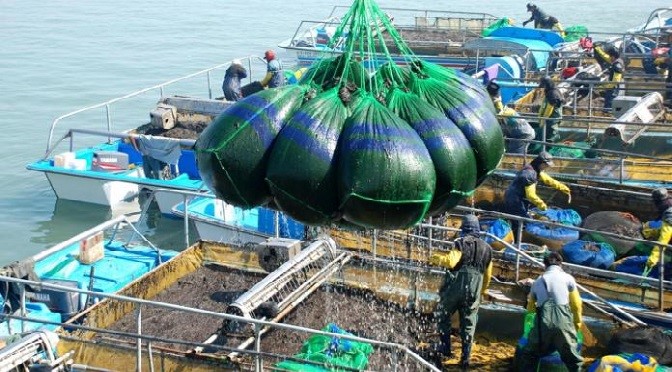SEAWEED IS BECOMING AS POPULAR AS GOLD

[Global] Seaweed has become increasingly popular over the past 50 years and now used in a number of different ways. Seaweed farmsacross the globe collectively produce more than 25 million tons per year, giving the crop a global worth of around $6.4 billion based on 2014’s figures. It has now become an even bigger seller than both lemons and limes. China is the world’s biggest producer of seaweed, producing more than half the global total (12.8 million tons), with Indonesia coming in second at 27% of the global total, equating to 6.5 million tons.
Because of the boom in the seaweed industry and previous mistakes involving bananas and shrimp industries, the UN University’s Canadian-based Institute for Water, Environment, and Health and the Scottish Association for Marine Science published policy advice for all those involved in the business to try and avoid history repeating itself. Seaweed is now used for purposes including, but not limited to, pharmaceuticals, nutraceuticals and antimicrobial products and biotechnological uses. It’s also used in some skin care products, toothpaste, paints, and industrial products.
Cultivating seaweed does not require any additional feed or fertilizers, and various governments have actively promoted it through initiative schemes. It’s also being integrated with intensive fish farming to provide nursery grounds for some fish and crustaceans, improve the marine environment, to filter unwanted nutrients, and to reduce water pollution. Seaweed farming has also helped some of the problems caused by over-fishing by providing residents with an alternative livelihood.
However, according to the authors of the policy, any industry can suffer from unforeseen ecological and societal consequences and communities that rely on one single crop to sustain their livelihood become very vulnerable. Their advice is to guard against any non-indigenous pests and to promote the genetic diversity of seaweed continually. To not use any illegal pesticides or algicides is also highly advised as could result in an adverse impact on the industry. The policy also states that there needs to be effective co-ordination and co-operation between different users of the maritime space to ensure efficiency in all areas and minimum disruption to the marine environment.
DIEP THAO CO., LTD
 2C Duong Ba Cung Street, An Lac A Ward, Binh Tan District, Ho Chi Minh City, Vietnam
2C Duong Ba Cung Street, An Lac A Ward, Binh Tan District, Ho Chi Minh City, Vietnam
 diepthaoco@gmail.com ,
diepthaoco@gmail.com ,
 www.diepthao.com.vn
www.diepthao.com.vn
Copyright © 2016 DIEP THAO
Designed by Viet Wave